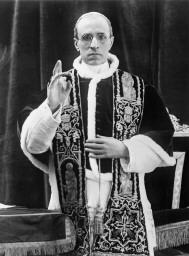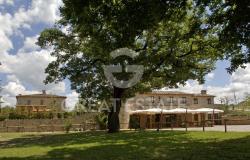New research clears controversial wartime pope Pius XII from the accusation that he did not do enough to save Jews, Pope Benedict XVI said on Thursday.
It is the first time the pope has come out publicly to defend the record of his WWII predecessor, who is moving towards sainthood despite accusations of keeping silent about the Holocaust.
''(Pius XII) spared no effort, wherever it was possible, to intervene (for Jews) directly or through instructions given to individuals or institutions in the Catholic Church,'' Benedict told a conference which presented new work on Pius.
He said Pius had to work ''secretly and silently'' to ''avert the worst and save the highest number of Jews possible,'' Benedict said, repeating assertions made by Vatican experts in the past.
The pope also restated that Pius was thanked by Jewish groups during and after the war.
He cited a meeting Pius had in the Vatican in November 1945 with 80 death-camp survivors who ''thanked him personally for his generosity''.
The pope thanked the Pave the Way Foundation, made up of Catholics and Jews, for uncovering the evidence in favour of Pius.
He voiced the hope that further studies can reinforce ''the historical truth, overcoming all remaining prejudice''.
Benedict's statement on the new research - which has not yet been made public - follows last year's assertion by his No.2, Cardinal Tarcisio Bertone, that people ignore evidence disproving Pius was indulgent towards Hitler.
Pius was the victim of a ''black legend'', said Bertone, the Vatican Secretary of State.
Bertone said the idea that Pius was culpably silent while Nazis exterminated millions of Jews ''has become so firmly established that even scratching it is an arduous task''.
Critics, among them many Jewish associations, argue that a firm, public stance from the pope could have changed the course of the war and stopped Hitler earlier.
They also question his decision to shelve a document fiercely critical of Nazism which had been prepared by his predecessor, Pius XII.
Bertone said Pius was cautious about publicly denouncing Hitler and the Holocaust because he believed this would have made the Nazi regime intensify its persecution of Jews.
Supporters have also pointed out that, under the pope's orders, convents, monasteries and other Catholic institutions threw open their doors to Jews who were hidden and protected there. Many were also hidden in the Vatican.
Pius XII, who was pope from 1939 to 1958, took a crucial step on the way to sainthood last year when a panel of top Catholic prelates voted in favour of recognising Pius's ''heroic virtues''.
This is the key requirement for beatification, the penultimate stage before sainthood. Procedures to canonise the pontiff have moved slowly since they started in 1967, partly because of the controversy over his stance on Nazism.
Jewish groups in Italy and abroad have repeatedly urged the Vatican not to push forward the pontiff's beatification ''at any cost'', noting that Pius's actions were a ''delicate issue'' in Christian-Jewish relations.
Pius's conduct during WWII has been the subject of several books, one of them entitled Hitler's Pope.










